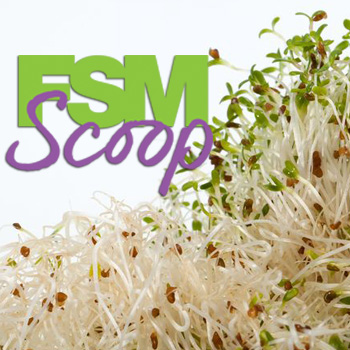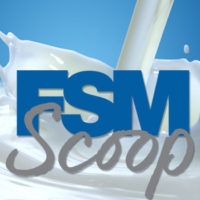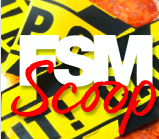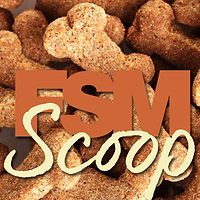FSM Scoop: Raw Sprouts

Sprouts come in many varieties––alfalfa, broccoli, clover, radish, soybean, wheatgrass and others––that are believed to possess massive health benefits. Alfalfa sprouts, for example, contain phytochemicals that are said to protect against cancer and high cholesterol.[1]
Some sprouts can also aid with excessive bleeding related to open wounds and nasal passages.[2] With so many health benefits to gain, it’s hard to imagine that this superfood has also caused quite a stir in the food safety industry.
20 Years of Recurring Recalls
Although sprouts have made their way to the food safety forefront recently with a string of new recalls, their susceptibility to wreak havoc on the human body is not a new phenomenon. At least 30 outbreaks associated with sprouts have been reported since 1996––most of them caused by Salmonella and Escherichia coli (E. coli).[3] Recommendations on Sprouted Seeds, an advisory published by the U.S. Food and Drug Administration (FDA) in 1999, even hints that raw sprouts had been (and still are) linked to foodborne outbreaks.[4] The largest outbreak linked to raw alfalfa sprouts may well have been in 2009, when 235 people in 14 states were infected with a strain of Salmonella Saintpaul.[5]
In May 2014, an E. coli O121 outbreak related to raw sprouts sickened 19 people in California, Idaho, Michigan, Montana, Utah and Washington. Seven of these individuals were known to be hospitalized. No deaths from the outbreak were reported. Thirteen of the 16 victims had reported eating raw sprouts in the days before they fell ill. Health officials were able to trace the contamination back to raw clover sprouts produced by Evergreen Fresh Sprouts, LLC in Hayden, ID. After reviewing documents, Evergreen was found to have distributed sprouts to a number of establishments where victims were believed to have consumed contaminated sprouts. Victims in Idaho and Washington had one thing in common––they’d all eaten sprouts in sandwiches at one of three local delicatessens.[6]
A Salmonella Enteritidis outbreak related to Wonton sprouts in December 2014 prompted Marler Clark––a Seattle-based law firm specializing in foodborne illness cases––to ask the FDA to make warning labels on packaged raw sprouts mandatory.[7] More than 100 people in 12 states were sickened. Bill Marler, managing partner at Marler Clark, has suggested that sprouts display a warning label similar to those found on unpasteurized juices:
WARNING: This product may contain harmful bacteria that can cause serious illness in children, the elderly, and persons with weakened immune systems.
Even more recently in 2015, a number of soybean sprouts recalls have emerged, warning consumers that some prepackaged bags may be contaminated with Listeria monocytogenes––a pathogen that is especially dangerous and even life threatening to children, the elderly, pregnant women and those with weakened immune systems.[8] The Listeria contamination was uncovered when the FDA collected and tested a random sample of sprouts at the Salinas, CA-based Hanbit Enterprises Inc. (dba Jack and the Beanstalk) as part of an pre-existing routine program.[9] In April and May, soybean sprout contaminated with Listeria also prompted recalls by Henry Farms and Good Seed, Inc.--both based in Virginia.
Not all contaminated sprouts become diseased by chance, as is the case with RZM Food Factory. In late 2014, owner William Oshiro ultimately agreed to stop producing and distributing fresh sprouts just as the FDA had asked a federal judge in Hawaii to shut the operation down. After 13 years of investigations and inspections, the facility was continuously found to be in violation on many fronts––filthy conditions including unkempt trash, rust, insect and pest infestations, standing water, improper washing and sanitizing practices––that contributed to the poor cultivation of sprouts. Despite these conditions, the FDA never linked RZM to any sprouts-related illnesses or foodborne outbreaks.[10]
The Makings of an Outbreak
Spouts cannot be singled out as the only raw food type that can lead to an outbreak. The risk of foodborne illness is associated with any raw or improperly cooked food item. The difference with sprouts is that its seeds and beans are unique in that they require warm, moist conditions to grow. Unfortunately––especially where seeds are present––this is also the perfect environment for the bacterial growth of Listeria and other foodborne pathogens. Bacteria makes its way into seed cracks before the sprouts reach their full growth potential. Once bacteria implants itself into the seed, it’s nearly impossible for it to be removed––even with a thorough washing.[11] For consumers that believe home growing their produce is the safer way to go, think again. Bacterial growth and contamination can occur at home as well––and it’s not visible to the human eye.
The Road to Prevention
While there are ways to kill bacteria on sprout seeds, and even some tests are on the market to identify contamination, there is currently no known proven method to completely kill all bacterial growth in sprouts.[12]
In 1999, the FDA took a proactive step by providing sprout growers with best practices on how to reduce sprout contamination. Sixteen years later, along with other federal and state agencies, the FDA continues to guide farmers on how to identify and fight bacterial growth. Still, there is no surefire way to eradicate such contamination completely.[13]
Taking things a step further, researchers have tried numerous solutions to try destroying bacteria on sprouts/seeds. Methods have included heating or washing seeds and sprouts with a variety of chemical solutions, including chlorine and alcohol. While some methods did reduce bacterial levels, seeds and sprouts still posed health threats to consumers, specifically those with weakened immune systems. Exposing bacterial growth to extremely high temperatures did kill pathogens; however, this method also prevented sprouts from growing.[14]
Despite the laundry list of associated recalls, raw sprouts are still one of the greatest super foods out there. With a little more attention and prep time, sprouts can continue to be apart of any consumers’ healthy raw diet.
References
1. http://www.health.com/health/gallery/0,,20662664_2,00.html.
2. http://67.228.126.128/~isgasorg/wp-content/uploads/2013/01/HealthBenefitsofSproutsISGAFlyer.pdf.
3. http://www.foodsafety.gov/keep/types/fruits/sprouts.html.
4. http://www.fda.gov/Food/FoodborneIllnessContaminants/BuyStoreServeSafeFood/ucm078789.htm.
5. http://www.cdc.gov/salmonella/saintpaul/alfalfa/.
6. http://www.foodpoisonjournal.com/foodborne-illness-outbreaks/salmonella-and-e-coli-outbreaks-why-does-jimmy-johns-serve-sprouts/#.VOtwOVPF9LE.
7. http://www.foodpoisonjournal.com/food-policy-regulation/another-sprout-outbreak-we-need-a-warning-label-says-marler/#.VPC-hlPF9LF.
8. http://www.perishablenews.com/index.php?article=0042485.
9. http://www.fda.gov/Safety/Recalls/ucm434406.htm.
10. http://www.thepacker.com/fruit-vegetable-news/Sprout-grower-shuts-down-after-13-years-of-violations-286233501.html.
11. http://www.fda.gov/Food/ResourcesForYou/HealthEducators/ucm082417.htm.
12. http://www.foodsafety.gov/keep/types/fruits/sprouts.html.
13. http://www.foodsafety.gov/keep/types/fruits/sprouts.html.
14. http://www.foodpoisonjournal.com/food-policy-regulation/another-sprout-outbreak-we-need-a-warning-label-says-marler/#.VPC-hlPF9LF?.
Looking for a reprint of this article?
From high-res PDFs to custom plaques, order your copy today!








